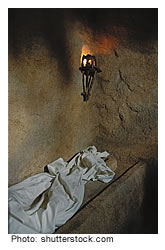Easter robs death of the ‘dignity’ it claims for itself. It gives us the sure and certain word that Jesus died for our sins and, therefore, the grave cannot hold us.
by Rev. John T. Pless

When the true God disappears, the fairy tales arrive, said Luther. Our age is inundated with fairy tales regarding death. One fantasy is that death with dignity is something that can be sought after and achieved. But in the Holy Scriptures, death is the “last enemy,” the result of sin.
“Originally death was not part of [man’s] nature. He dies because he provoked God’s wrath. Death is, in his case, the inevitable and deserved consequence of his sin and disobedience,” Luther writes (AE 13:94). Luther states the biblical truth (see Gen. 3:19; Psalm 90; 1 Sam. 2:6; Rom. 5:12–17). Where there is sin, there death reigns. It is God Himself who executes the death sentence. There is no dignity in death.
Contrast this with the way that death is often pictured today. Death is seen as part and parcel of the grand scheme of things. Our culture perpetuates the myth that death is natural, nothing more than an inevitable and unavoidable turn in the cycle of life. As spring follows winter, as the brightness of the dawn comes after the darkness of night, so death comes after life. In the everturning and never-ending repetition of existence, life leads to death and death back to life.
Or else death is seen as arbitrary and accidental. Then it is thought that death can be prevented or stalled. Advances in medical technology prolong life and lessen, at least temporarily, the effects of aging and disease. Improved diet and regular exercise are thought to delay death. Efforts in education are marshaled to increase public safety, making death less likely on the highways and in the workplace. Some even dream of a future where science will have found a way to perpetually renew and repair the body so that death becomes obsolete. We do the best we can to manage death. We seek death with dignity. If death finally cannot be avoided, we will at least engineer the time and the place. We will take our own life before it can be ripped from us. (That, of course, is euthanasia, or suicide.)
Seeking Justification
For all its attempts to naturalize death, to deny its linkage to our sin and God’s wrath, and to beckon death to conform its arrival to our timing, our age retains some recognition that death is about a judgment. It is evidence of Lutheran theologian Oswald Bayer’s assertion that the universe is structured so to demand justification. We are always trying to justify ourselves. At the end, we want our lives to be accounted right, to be declared of worth and value. Listen to the eulogies delivered at the funeral rites for unbelievers.
They attempt to justify, that is, they render a judgment that the life of the deceased was worth something because he was a devoted husband who was faithful to his wife, a loving father who sacrificed for his children, a successful businessman or a skilled mechanic, an active member of the Rotary Club or the Republican (Democratic) Party—the list goes on. Is it not strange that those who would deny the existence of God feel themselves compelled to justify life in the face of death? If it is true that death is just part of life, why do people go to such great lengths to defend themselves against it?
A Portal to Life
Christians alone are finally able to see death for what it is—God’s own termination of sin. God’s law speaks and carries out a death sentence. It is not simply that human beings are mortal and are therefore deprived of life. Then the cure would be immortality.
Rather, human beings are sinners who must die. The answer to death is not to be found in engineering a way around death—or through death, embarking on a journey to “the other side”—but by hearing a word of absolution that announces and bestows the forgiveness of sins. Where there is forgiveness of sins, death is robbed of its terror. Death swallowed up by the death of Jesus on the cross now becomes the portal to life everlasting. Luther puts it like this in his great Easter hymn:
No son of man could conquer death,
Such ruin sin had wrought us.
No innocence was found on earth,
And therefore death had brought us
Into bondage from of old
And ever grew more strong and bold
And held us as its captive. Alleluia!
Christ Jesus, God’s own Son came down,
His people to deliver;
Destroying sin, He took the crown
From death’s pale brow forever:
Stripped of pow’r, no more it reigns;
An empty form alone remains;
Its sting is lost forever. Alleluia!
It was a strange and dreadful strife
When life and death contended;
The victory remained with life,
The reign of death was ended.
Holy Scripture plainly saith
That death is swallowed up by death,
Its sting is lost forever. Alleluia!
—“Christ Jesus Lay in Death’s Strong Bands” LSB 458
 By Jesus’ death, the last enemy is disarmed, for where the forgiveness of sins reigns, death is deprived of its sting; there is only life and salvation. So we confess in the Small Catechism that it is Jesus who has purchased and won us from sins, death, and the power of the devil “that I may be His own and live under Him in His kingdom and serve Him in everlasting righteousness, innocence, and blessedness, just as He is risen from the dead, lives and reigns to all eternity.”
By Jesus’ death, the last enemy is disarmed, for where the forgiveness of sins reigns, death is deprived of its sting; there is only life and salvation. So we confess in the Small Catechism that it is Jesus who has purchased and won us from sins, death, and the power of the devil “that I may be His own and live under Him in His kingdom and serve Him in everlasting righteousness, innocence, and blessedness, just as He is risen from the dead, lives and reigns to all eternity.”
Jesus, who was made sin for us, dies with the dignity of a condemned criminal bearing our shame. Handed over to wicked men, Jesus is stripped, beaten, and pinned to a cross where He dies as one judged guilty. Yet in this single death, sin is atoned for by the blood of God’s Son. Death is defeated, not by a raw act of God’s power, but by the Passion of God’s Son—the suffering that submits to death, and in doing so destroys death, for where sin is removed the last enemy has lost its grip on sinners.
By becoming the victim, Jesus wins the victory. Luther puts it nicely in an Easter sermon from 1529:
Christians from their own standpoint are a Judas, a
Caiaphas, a Pilate, and find themselves condemned. But there
is another Person who took my sins on Himself. On Good
Friday they are all laid around His neck. But on Easter I also
look at Him, and then He has none…. Thus sin is completely
taken away in the Resurrection. Everyone should learn this
today, that all of us should abandon thoughts about ourselves
and should not pass judgment on ourselves according to our
feelings. For this is contrary to Christ and the Gospel, which
says that Christ has taken away the sin from our hearts and
consciences and laid them on Himself. For this reason the
apostles praise the resurrection unceasingly.
—The 1529 Holy Week and Easter Sermons of Dr. Martin Luther (CPH, 1999, p. 127)
More Than a Confirmation
Jesus’ resurrection from the grave is more than a confirmation that there is life after death. Death is not part of an inevitable cycle: life to death and then back to life again. Jesus is raised from the dead without the sins He took to the cross; they are left buried forever. Put to death for our trespasses and raised again for our justification, Jesus, through His resurrection, announces and declares that our sins are forgiven.
When Jesus comes to His disciples, who had locked themselves up in fear on Easter evening (see John 20:19–23), He brings to them the glad news of His resurrection with His word of peace and the sight of His pierced hands and punctured side. His word of peace is, in effect, an absolution. Coupled with the marks of His passion, Jesus’ words bestow on His disciples the result of His death for sin: peace with God. When the Lord speaks His peace to the disciples a second time, breathing on them His Spirit, He sends them to forgive sins: “If you forgive the sins of any, they are forgiven them” (John 20:23 ESV). Only Jesus’ forgiveness, won at Calvary in His dying, holds power over death. Where there is no forgiveness of sins, death remains lord. But where Jesus forgives sin, death is toppled from the throne. Death no longer can hold sinners in its iron grip.
All of us will die. Unbelievers die in their sins. The consummation of such dying is hell. Believers die to their sins. The consummation of such dying is heaven. The forgiveness of sins bestows the gift of the resurrection to life everlasting. Embedded in the absolution is the promise of the resurrection. When you hear your pastor speak those words, you are given the gift of your own resurrection ahead of time. When you hear the absolution, Christ Jesus is telling you that your sins will not hold you captive in the grave.
Easter robs death of the dignity it claims for itself. We are freed from the mythologies of our culture that would seek to give us power over death. Easter gives us something far better. Easter gives us a sure and certain word: Jesus died for your sins. God has raised Him from the dead. The grave cannot hold Him. Neither will it be able to keep those who are His. You need not worry about a death with dignity, for you have the absolution. It is a word that gives life to the dead, and it is for you.





